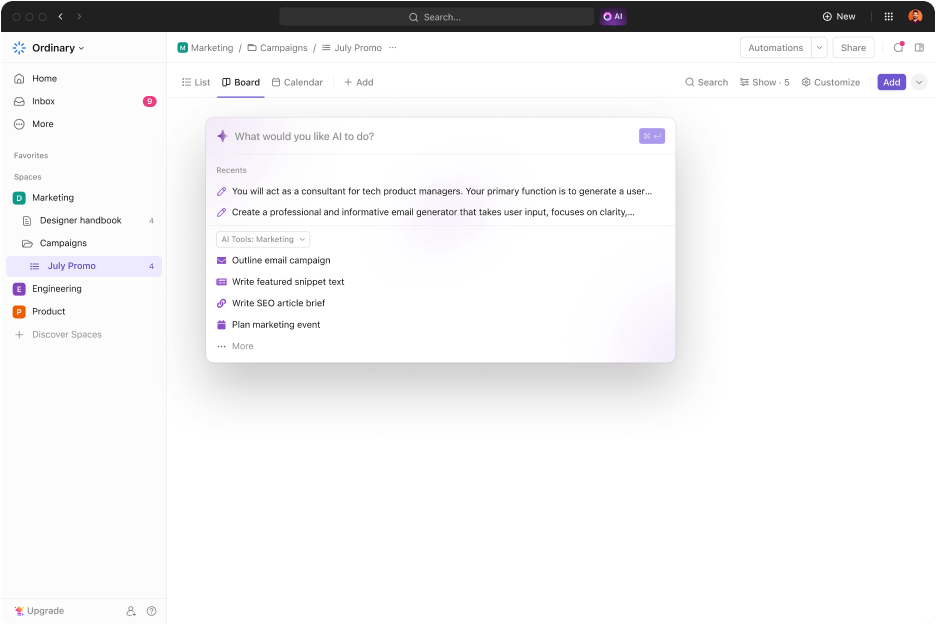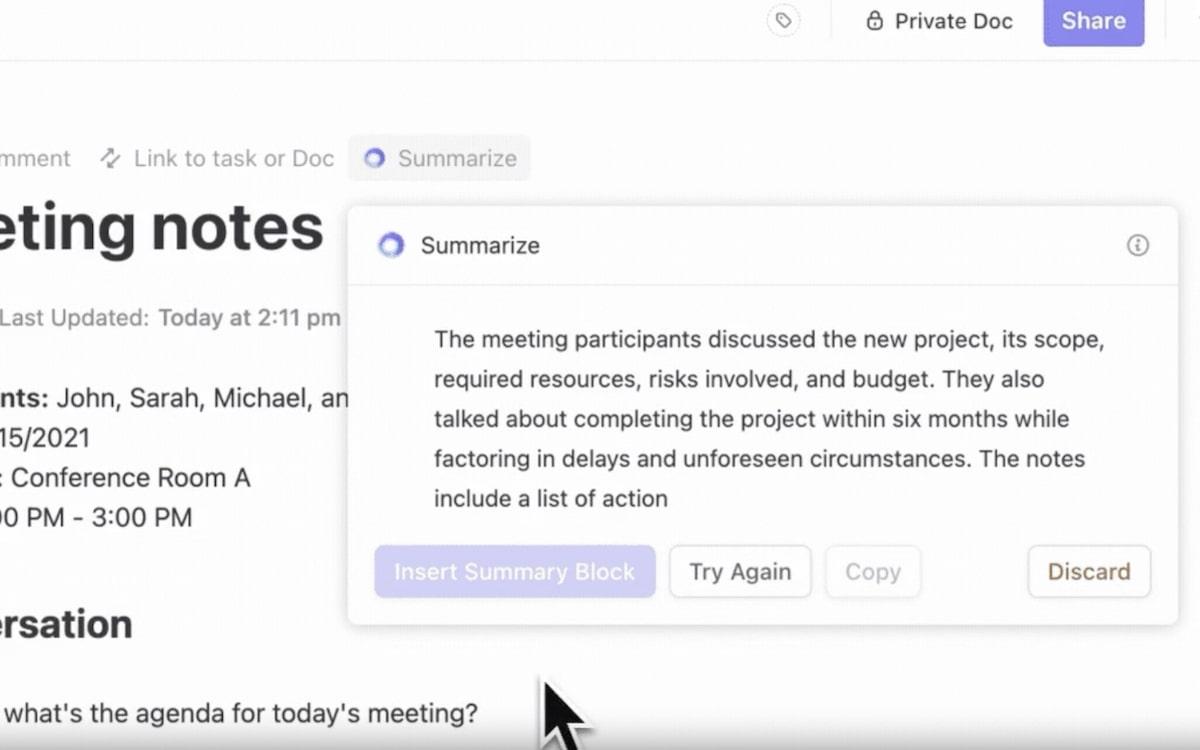AI Anxiety: Is AI Stealing Your Job (and Your Sanity)?

Sorry, there were no results found for “”
Sorry, there were no results found for “”
Sorry, there were no results found for “”
From Colossus to Terminator to Agent Smith, popular culture is rich with examples of artificial intelligence (AI) gone rogue.
Dystopian stories aside, it’s normal to wonder about or even fear an AI takeover. After all, our news feeds are full of stories of AI technology outperforming humans. So if you or those around you are struggling with AI anxiety, know that you’re not alone.
And we’re here to help!
So, take a deep breath as we help you navigate the promising world of AI together—minus the anxieties!
AI technology has touched nearly every aspect of our professional and personal lives. You may use AI in marketing to generate rich media content or write captivating ad copy.
Your product teams might use AI in software development for code completion, automated testing, and code documentation.
AI for HR comes in very handy when screening large numbers of job applicants, scheduling interviews, and more.
Then, of course, no customer support experience is complete without ubiquitous chatbots and virtual assistants.
And that’s just scratching the surface.
As we interact with a growing number of AI tools, many of us may feel a twinge of unease. Does the AI seem eerily human? Is my data secure? Will AI soon be able to take over my job?
These feelings of worry are what we call AI anxiety.
AI anxiety isn’t necessarily the fear of robots taking over. Instead, it’s a complex emotion that may emanate from the fear of job displacement to uncertainty about the future of the human race, and everything in between!
Consider how content writers felt when generative AI tools like ChatGPT became mainstream or how deep fakes of political leaders confused the world. AI anxiety is partly the whiplash many of us experience when confronted with the rapid rate of technology development.
Interestingly, this isn’t a recent phenomenon. Throughout history, people have often resisted technological advancements.
Take, for example, the Luddite movement, where textile workers opposed the use of mechanized looms or knitting frames. Or how people believed the telegraph would lead to social unrest and panic when it became mainstream in the 19th century. We’ve also had computer anxiety in recent years!

In short, it’s absolutely valid to feel anxious. AI is a complex new technology that’s growing at a breakneck speed. Naturally, navigating the uncertain future it may bring is daunting.
What makes us fear AI technology in the first place?
Well, the answer is multifaceted. So let’s dissect each element:

Whether these fears are unfounded or based on the truth is a whole different debate. The source and intensity of such anxiety varies depending on each individual’s background and experiences. It might even stem from a cause that’s not listed above!
To put it in another way, AI anxiety is very real and it’s a lot more widespread than you may think—as we’re about to explore in the next section.
We rounded up some AI statistics surrounding AI anxiety. Here’s what we found:
Anxiety is a normal human emotion that manifests in different forms. However, AI anxiety stands out in a few ways. For one, regular anxiety focuses on multiple stressors or triggers ranging from uncertainty, financial concerns, health conditions, or social interactions—most of which are hypothetical or even abstract.
On the other hand, AI anxiety stems from a specific concern related to AI’s development and impact on human life. The tangible presence of AI makes these anxieties very real and immediate.
Here are some signs you could be experiencing AI anxiety:
Here are some practical tips on how to reduce workplace anxiety:
It is only natural to fear something you don’t fully understand. So, bust out that AI glossary to tame the monster! Explore online courses, resources, or libraries to dive right in. Once you get a deeper understanding of the basics, such as common terms, types, capabilities, and limitations, you’ll feel more confident in knowing that it (currently) does not hold a candle to emotional intelligence.

Explore the various opportunities AI advancements may unlock in different fields. Research about the headways it’s making in climate change, healthcare, and education. Of course, stay wary of the potential dangers, but do not be consumed by it. Focus on the real-world benefits you see around yourself.

Exposure therapy can a great way to overcome your fears. So, use AI for daily life tasks to become more comfortable around it. Craft emails using generative AI tools or experiment with AI as a personal assistant. Getting first-hand experience of how AI integrations boost productivity can be a masterclass in dispelling misconceptions.
Sure, nobody knows which new technology may disrupt the world next. Try to take the upward AI trend as a sign to identify areas where AI complements your skills and natural talents. Explore learning opportunities related to other new technologies like automation, data analysis, and human-computer interaction to pad your resume.
Become an active member of online forums and communities about AI. Use this stage to voice your concerns, ask questions, and gain insights from others in the same boat as you. You can even seek out and engage with experts to gain different perspectives and informed opinions. Such constructive interactions will challenge your inaccurate thoughts, perceptions, and assumptions about AI.
And if you’re still biting your nails, here’s what Pascal Bornet, renowned AI expert and bestselling author of IRREPLACEABLE, says about what makes humans so special:
To answer this question, look to children. They are the purest version of ourselves. They embody innate traits that evolution has refined over millions of years, setting us apart from other species.
In the playground, children exhibit three key abilities:
Genuine creativity: Building sandcastles and imagining new worlds, children are natural creators. Genuine creativity is not taught; it flows naturally, an intrinsic part of their being.
Critical thinking: Debating game rules and reaching compromises, children demonstrate the foundations of analytical thought and human values.
Social authenticity: Welcoming newcomers and forging connections through play, children showcase the essence of human interaction, communication, and empathy.
These innate abilities – genuine creativity, critical thinking, and social authenticity – are the cornerstones of our humanity.
Read Pascal Bornet’s newsletter on AI to learn more.
Advancements in technology have been a part of human civilization from the very beginning. There’s no reason for your physical and mental health to unduly suffer because of it. Practice relaxation techniques such as meditation, deep breathing exercises, or yoga to manage symptoms of anxiety. Also ensure you’re getting sufficient sleep, following a healthy diet, and exercising regularly.
Caring for your mind and body will make you more resilient to stress and anxiety. For instance, a speaking to a qualified therapist may help you accept what you cannot control and work on issues you can. Consider taking breaks from stressors or triggers until you create a healthy coping strategy.
While most of the tips shared above are helpful in the long run, you might also require short-term strategies for when the anxiety builds up. Here are some quick yet effective exercises:
While AI anxiety is a genuine concern for most of us, it shouldn’t hold you back from living your best life today. Interestingly, the solution could be hiding in the very thing you fear—artificial intelligence.
You may know ClickUp as an all-in-one project management tool. But did you also think that you could use it—specifically ClickUp Brain—to overcome AI anxiety?
Yes! ClickUp Brain is your built-in teammate that lets you become comfortable around AI. As a role-specific AI that offers contextual assistance within your workspace, ClickUp Brain can help you:
Create content faster: Forget struggling with proposals, project plans, and customer emails from scratch. ClickUp Brain offers research-powered prompts, allowing you to create high-quality, relevant content in a flash
Focus on high-value tasks: Wasting time hunting for the right information, tool, or feature? Not with ClickUp Brain. It anticipates your needs based on your role and what you’re working on. Need a task summarized? Update progress? Generate to-dos? You got it!
How can you make the most of these capabilities at work? Let’s look at some popular use cases.

Feeling overwhelmed with all the learning resources or information about AI? ClickUp Brain can help you collect and categorize resources like online surveys, new studies, and innovation. It then organizes and presents this data as lists or mind maps to make the insights more accessible.

ClickUp Brain is a dependable project management assistant.
We’ll say it again, working with AI is one of the best ways to get over AI anxiety. Enlist ClickUp Brain’s help to create tasks or sub-tasks within your personal or work projects.
You can use it to summarize your daily tasks, provide an overview of what you need to focus on next, or even write a standup for your current project workflow.

Whether it is writing a social media post about your experiences with AI or summarizing notes from complex documents, ClickUp Brain makes writing less of a hassle. By delegating these tasks to AI, you gain firsthand experience of how AI can be beneficial so that you view it as a collaborator rather than a competitor.
We get it: Change is scary, and it causes anxiety. But don’t let it stop from achieving your goals.
AI is a technology made by humans for humans, and its impact depends on how we use it. Strategies like learning about AI technology, developing digital literacy and fluency, and engaging in conversations about it can transform anxieties into opportunities.
Hopefully, embracing the tips we’ve shared above will help you get out of your head and thrive alongside AI. Consider using ClickUp Brain to springboard into action and get AI to work for you! Sign up for a free ClickUp account now!
You may experience some anxiousness around AI because of:
Repetitive, data-driven jobs are most vulnerable to AI disruption. This includes roles like data analysts, data entry operators, software engineers, paralegals, project coordinators, writers, administrative workers, and more.
According to some studies, nearly 70% of employees fear artificial intelligence.
© 2025 ClickUp